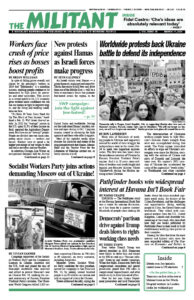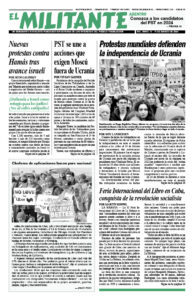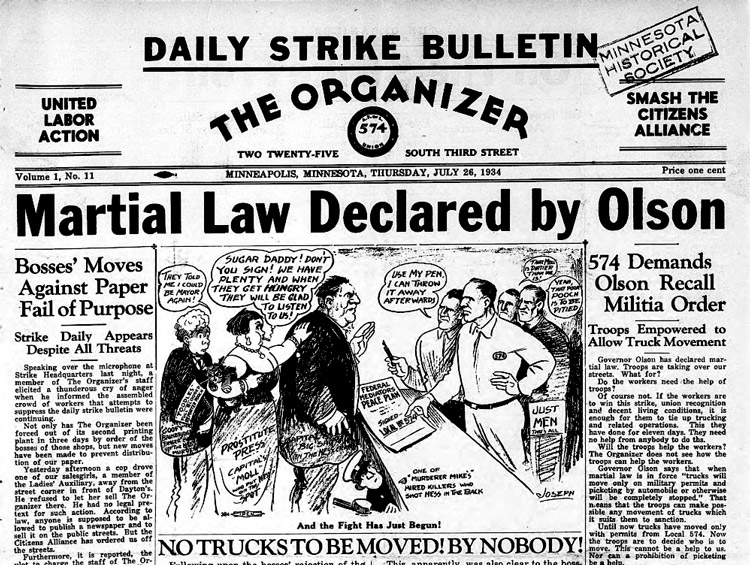The French edition of The History of American Trotskyism, 1928-1938: Report of a Participant by James P. Cannon is one of Pathfinder’s Books of the Month for February. Cannon, a founding leader of the Socialist Workers Party, explains in the book, “Trotskyism is not a new movement, a new doctrine, but the restoration, the revival, of genuine Marxism as it was expounded and practiced in the Russian Revolution and in the early days of the Communist International.” The excerpt is from Chapter 8, “The Great Minneapolis Strikes.” Copyright © 2002 by Pathfinder Press. Reprinted by permission.
The year 1933, the fourth year of the great American crisis, marked the beginning of the greatest awakening of the American workers and their movement towards union organization on a scale never seen before in American history. That was the background of all the developments within the various political parties, groups, and tendencies. This movement of the American workers took the form of a tremendous drive to break out of their atomized state and to confront the employers with the organized force of unionism. …
Our lecture tonight deals with the strike wave of 1934 as represented in the Minneapolis strikes. There, for the first time, the effective participation of a revolutionary Marxist group in actual strike organization and direction was demonstrated. The basis of these strike waves and organization movements was a partial industrial revival. …
Our people didn’t believe in anybody or anything but the policy of the class struggle and the ability of the workers to prevail by their mass strength and solidarity. Consequently, they expected from the start that the union would have to fight for its right to exist; that the bosses would not yield any recognition to the union, would not yield any increase of wages or reduction of the scandalous hours without some pressure being brought to bear.
Therefore they prepared everything from the point of view of class war. They knew that power, not diplomacy, would decide the issue. Bluffs don’t work in fundamental things, only in incidental ones. In such things as the conflict of class interests one must be prepared to fight. …
The fifth and crowning contribution that Trotskyism made to the Minneapolis strike was the publication of the daily strike newspaper, the Daily Organizer. For the first time in the history of the American labor movement, strikers were not left dependent on the capitalist press, were not befuddled and terrorized by it, did not see public sentiment disoriented by the capitalist monopoly of the press. The Minneapolis strikers published their own daily newspaper. This was done not by a half million coal miners, a hundred thousand auto or steel workers, but by a single local union of 5,000 truck drivers, a new union in Minneapolis which had Trotskyist leadership. This leadership understood that publicity and propaganda are highly important, and that is something very few trade union leaders know. It is almost impossible to convey the tremendous effect of this daily newspaper. It wasn’t a big one — just a two-page tabloid. But it completely counteracted the capitalist press.
After a day or two we didn’t care what the daily papers of the bosses said. They printed all kinds of things but it didn’t make that much difference in the ranks of the strikers. They had their own paper and took its reports as gospel. The Daily Organizer covered the town like a blanket. Strikers at the headquarters all used to get it straight from the press. The Women’s Auxiliary sold it in every tavern in town that had working-class customers. In many saloons in working-class neighborhoods they would leave a bundle of papers on the bar with a slotted collection can beside them for contributions. Many a dollar was collected that way and carefully watched by the friendly bartenders.
Union men used to come from the shops and railroad yards every night to get bundles of the Organizer for distribution among the men on their shifts. The power of that little paper, its hold on the workers, is indescribable. They believed the Organizer and no other paper. Occasionally a story would appear in the capitalist press about some new development in the strike. The workers wouldn’t believe it. They would wait for the Organizer to see what the truth was. Press distortions of strike incidents and outright fabrications — which have destroyed the morale of many a strike — didn’t work in Minneapolis. More than once, among a crowd that always surged around strike headquarters when the latest issue of the Organizer was delivered, one could hear remarks such as this: “You see what the Organizer says. I told you that story in the Tribune was a damned lie.” That was the general sentiment of the workers toward the voice of labor in the strike, the Daily Organizer.
This powerful instrument didn’t cost the union a penny. On the contrary, the Daily Organizer made a profit from the first day and carried the strike through when there was no money in the treasury. The profits of the Organizer paid the daily expenses of the commissary. The paper was distributed free to anyone who wanted it, but nearly every sympathetic worker gave from a nickel to a dollar for a copy. The morale of the strikers was kept up by it, but above all, the role of the Organizer was that of an educator. Every day the paper had the news of the strike, some jokes about the bosses, some information about what went on in the labor movement. There was even a daily cartoon drawn by a local comrade. Then there would be an editorial drawing the lessons of the past 24 hours, day after day, and pointing the way ahead. “This is what has happened. This is what is coming next. This is our position.”
The striking workers were armed and prepared in advance for every move of the mediators or Governor Olson. We would be poor Marxists if we couldn’t see 24 hours in advance. We called the turn so many times that the strikers began to take our forecasts as news and to rely upon them as such. The Daily Organizer was the greatest of all the weapons in the arsenal of the Minneapolis strike. I can say without any qualification that of all the contributions we made, the most decisive, the one that tipped the scale to victory, was the publication of the daily paper. Without the Organizer the strike would not have been won.


